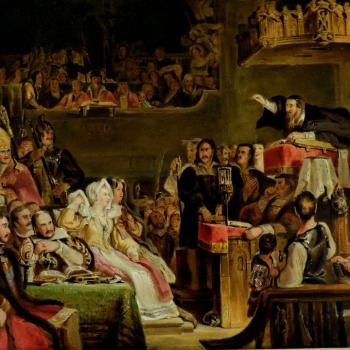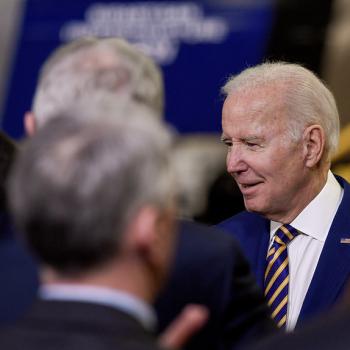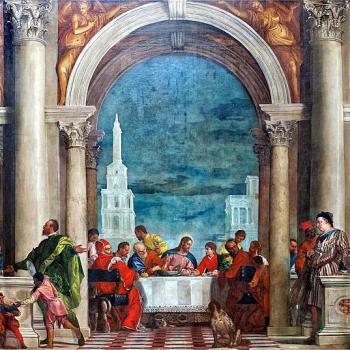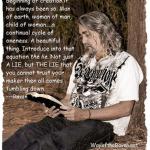Rachel Dobkin interviewed me in May for a Newsweek article that published this past Sunday entitled “Conservative Campuses Are Facing Cancel Culture Problems.” Dobkin discovered my story through the encouragement of Matt Warner and Karen Prior, who had read my Anxious Bench column in early May on my departure from Wheaton College, “And Come to the Defense of Those Targeted.” I voluntarily brought my story to Dobkin, shared with her for over an hour on the phone, and continued email correspondence with her for the next couple months. It’s difficult to interpret my story in the Newsweek article faithfully apart from the above linked Anxious Bench column. When read together the two narratives make sense and fit.
Sadly, some readers of the Newsweek article never saw my Anxious Bench column, and they have failed to recognize the complexity of my story. Those readers have conflated all of the stories in the Newsweek article and collapsed my story into the others as part of a simplistic narrative that nefarious conservative administrators fired liberal faculty from Christian colleges. Understandably, that is the case for some of those stories, but this column will not speak to the other stories because they belong to their storytellers. I will merely set the public record straight for my story in the Newsweek article.

How Social Media Influenced My Departure
Dobkin is an outstanding reporter. She had a difficult task of weaving complex stories into a large narrative. I believe that she faithfully presented the particularities of my story with journalistic integrity.
Here is what Dobkin reported about my story. She stated that “Joey Cochran…claims his departure was influenced by a few online incidents.” She then recounted two paradigmatic incidents, one about the Dobbs decision and the other about the Israel-Hamas Attack. Both incidents involved William Wolfe’s mobilization of a Twitter/X mob to attack me because of my affiliation with Wheaton College. In both instances, people who were either alumn, parents of prospective students, or those who believed Wheaton had drifted from its conservative course attacked my views and bullied me. These are people, who are part of the wider Wheaton College family and are an extension of it. That’s irrefutable. Furthermore, other members of the mob Wolfe mobilized were anon, neo-Nazi, radicals, who have nothing to do with Wheaton College. These people would like to see the destruction of liberalism in the U. S. and a new totalitarian regime established. If I showed you the receipts, which I have, you will be disappointed to discover that there is little distinction in the discourse of these two groups.
As my column in May indicated, my chair, vice-chair of faculty, and provost were exceedingly supportive when these attacks occurred. Their support was manifested by prayer for me, concerned conversation for my well-being, and affirmation of my belongingness at Wheaton College. This is to be commended all around.
However, when public support is not given to public matters, it leaves the mob to believe that they have won the day. Private support alone is not sufficient in an age increasingly empowered and polarized by social media influence. The absence of public support undercuts and weakens the perceived strength of an institution, like Wheaton College, leaving it vulnerable to perpetual attacks from social media bullies and mobs.
In Dobkin’s reporting, I stated that Wheaton College “has the potential to stand apart and lead the way in Christian public engagement, but it needs to make some bold moves yet to do so.” Contra to John Fea’s speculation, this statement has nothing to do with my ambition or desire for future employment at Wheaton College. Let me articulate precisely what I meant.
Wheaton College has never recovered from its failure to advocate and support Larycia Hawkins. That failure haunts the public engagement of every staff, faculty, and administrative member of Wheaton College, and it shapes the engagement policies of its marketing and communication department.
For instance, when Moody Bible Institute professor, Marcus Johnson, published a controversial Themelios (TGC) book review of his co-pastor, Amy Peeler’s book, Women and the Gender of God, more of Peeler’s colleagues might have felt empowered to rally to Peeler, a New Testament professor in the graduate school of Wheaton College, and advocate for her scholarship had the Hawkins Affair been handled differently. What if President Phil Ryken, a TGC board member and council member, had publicly applauded Amy Peeler’s scholarly productivity as a vote of confidence in his faculty member? What if Wheaton College’s marketing and communication department had offered an interview response from Peeler or press release about the book, in response to harassment from a mob mobilized by those sympathetic to the reviewers’ views? Sadly, in the days following the publication of this review, a passive sullen silence seemed to be the anticipated response to Johnson and others. I am pleased that Peeler has since been awarded an endowed chair position in the graduate school, an honor long merited, but wonder if the float of time between these two events is too long to see the indelible link between them.
My charge to Wheaton College is not to be a passive bystander when its faculty are mobbed and bullied. While faculty cannot convey their values as representing the views of the institution, the institution can convey its value of its faculty and its view that faculty have a right to participate in academic freedom and liberal discourse as private citizens. Engagement is required in a digital age.
Underemployment at Wheaton College
Dobkin reported that I received an underemployment offer for the fall of 2024 in October 2023, which I voluntarily declined. She reported that I declined that offer because it would be unmanageable for me to support my family with that compensation plan. I could not return to part-time work at Wheaton College. You see, I taught at Wheaton college for four semesters as a part-time adjunct faculty member, before I became an emergency re-hire for a one-year Visiting Assistant Professor appointment. That four semesters of part-time pay but full-time labor stretched us financially.
For instance, in the spring of 2023 I taught three four-credit courses at part-time compensation and supervised a student teacher in another division. Meanwhile, I managed social media for the Conference on Faith and History and edited the Anxious Bench, which other colleagues in the guild have mentioned in passing that this guild service normally would merit a reduction in teaching load at most history departments. The November prior to this semester we had to change out the HVAC system in our home and in March of that semester we had to change out our washer and dryer. If we had depended solely on compensation from Wheaton College, those two purchases alone would have more than exhausted my wages.
Frankly, when the emotional burden of being bullied on social media, because of my institutional affiliation with Wheaton College, is combined with the poor exchange of labor and compensation (a justice issue in itself), you can see why I voluntarily declined to continue my employment at Wheaton College. Ultimately, that’s how my voluntary “departure was influenced by a few online incidents.”
Wheaton College Statement and Stopped Search for Tenure Track Church Historian
Readers should not overlook that Dobkin requested comment, received a statement from Wheaton College, and published that statement. My story is the only story in her report that includes a statement from the institution, which differentiates my story from others.
Joe Moore stated “Joseph Cochran was not forced out of a position.” I agree that the administration did not overtly force me out of my position, but that does not mean that no forces were in play that acted upon me to leave my position. The hits I took on social, “from the rising intensity of conservative politics,” and my ongoing condition of underemployment led me to conclude that I had no choice but to depart from Wheaton College. These were not sustainable conditions for my mental, emotional, and physical flourishing. These circumstances led me to perceive the idol factory ways of my heart. I had no alternative but to force myself to leave Wheaton College, for I had fashioned employment at Wheaton College into an idol in my heart. It is in that sense that the Newsweek article is true to its statement that I am one of “an increasing number of academics…claiming that they were forced out of their jobs because of the rising intensity of conservative politics on campuses.”
In a parking lot conversation with my friend Vincent Bacote, I shared that my departure had as much to do with tearing down an idol as anything else. In another meet-up with friend and mentor, Tim Larsen, I declined his offer to advocate for my continued employment at Wheaton College because I had sensed the Holy Spirit moving me elsewhere. Karen Johnson, my recent department chair, constant friend, and ally knows very well the good intentions of my heart and my desire to have had a congenial parting with Wheaton College.
Joe Moore stated I was a “sabbatical replacement for a history professor.” Now, let’s be clear. I was a sabbatical replacement every semester I was at Wheaton College. The history department at Wheaton College has leaned on adjuncts to fill the load that one of the tenure-track professors leaves each semester when they are on sabbatical. And this fall would have been an ideal time for me to have a sabbatical rest, after six semesters of rigorous service to the department.
The history department long has wanted an additional tenure-track professor of church history to provide relief to the department, meet the teaching needs of students, and fill the hole other professors leave during their sabbatical rotation. The department attempted a search for a tenure-track assistant professor of church history for the 22/23 academic year back in the fall of 2021. I applied for that position and was considered a candidate for it.
The administration stopped that search in the spring of 2022 because of budget cuts. When the search happened, the history department had six tenure-track professors, and they intended to add a seventh. Wheaton College notified seven tenure-track faculty across all departments that they would be laid-off, during spring of 2022 academic year budget-cuts. The laid-off tenure-track faculty were given a generous guarantee of two more academic years of employment, while they looked for new opportunities.
Those cuts affected the history department, reducing it to five tenure-track faculty. The historian who had been reduced from the history department found a position in administration at Wheaton College halfway through the two-year notice. Because there was a year left of budget allocated for a full-time faculty member in the department, Wheaton College was able to secure a one-year visiting appointment, which I filled. I was then added to a cohort of new full-time faculty for the 23/24 academic year, which included six new tenure-track faculty and one visiting assistant professor, myself.
Even before this, in the fall of 2022, the history department performed its 10-year review. The external auditor for the review recommended that Wheaton College restart its search for a tenure-track church historian. Unfortunately, the administration did not approve restarting that search in the spring of 2023, as expected.
Furthermore, since the history department expected to hire a church historian from 2021 to the present, like any other department that has needs, they have used their resources to welcome plausible candidates for speaking engagements and have had ongoing conversations and collaborations with those people during this time. One can only expect this to continue until they are allowed to open up a line for a tenure-track church historian. As a participant in the department, I could not help but notice this dynamic. Some of the candidates not only have been guild colleagues but friends, who are exceptionally qualified and plausibly better candidates than me.
This historical context clarifies why I had a diminishing resolve towards my course of long-suffering and voluntarily declined future employment at Wheaton College.
Wheaton College needs an American church historian. This is a lacuna in the profile of its current faculty. I admonish potential donors to endow a chaired position in American church history, so a truly qualified candidate may offer this service to evangelicals.
Purdue University Northwest Visiting Instructor Position
I deliberately gave Wheaton College every opportunity to roll back its decision in letting my talent go, all the way up to my exit interview with the provost in mid-May, 2024. I did not apply to open positions until after that exit interview. I was quickly picked up by Purdue University Northwest (PNW) before the end of June, so that I could announce my new position on July 1, the day after the end of my employment at Wheaton College.
When I spoke for the history department chapel in the spring of 2023, I asserted that the center of gravity for evangelical advancement typically moves to the frontiers or voids of gospel influence. Because good news requires good neighbors to bring it, the missional impulse of evangelical action requires the center to move to fringes where neighborly goodness can be most felt. The Southside of Chicago and “the Region” of Northwest Indiana have long been inviting opportunities and places for good neighbors to bring good news. Teaching at a well-funded state university that has a vision of uplift for its region is an opportunity for me to partner in work that others have long been engaged. Teaching a diverse student population that overwhelmingly favors first-generation students, like myself, is an attractive opportunity. I see my opportunity at PNW as a value-added opportunity for me to grow in learning, listening, and living to the fullest potential of the gospel.
Contrary to what some believe, rather than being forced out of Wheaton College, I believe I have been sent out by Wheaton College, concomitant to its tradition of sending people out in mission. When Dobkin interviewed me, I referred to Wheaton College as the pearl of Christian liberal arts colleges. The last six semesters of instructing quality students at a liberal arts college recognized for academic excellence has richly prepared me for the work ahead. My colleagues in the history department, other departments, and the provost herself have modeled Christian charity, virtue, and spoken truths into my life that I will forever cherish. I received from them unparalleled mentoring that inspires me to pass on the spirit of good neighborliness to my new colleagues. I have never been more thrilled for the start of a new semester, and I know that my new learning and teaching context are opportunities for me to see human flourishing at its finest.

















